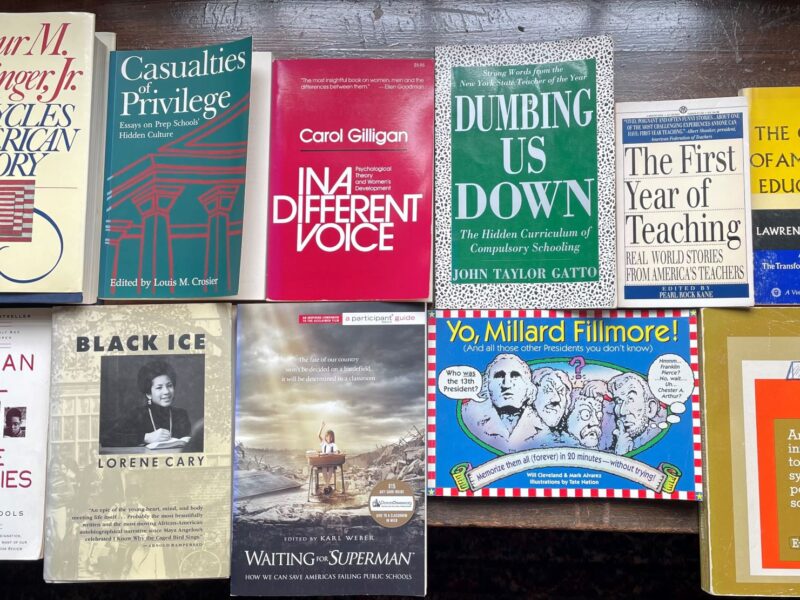Some have suggested that my latest “culture post” gave parents a bad rap. That was not really my intention. Hey, not only are some of my best friends parents, I happen to be one myself.
What I would like to see is a new and improved student-teacher-parent triad in our schools and culture at large.
American education started out with a classical purpose: transmitting knowledge via traditional subject matter. Educational thinkers like Thomas Jefferson and Horace Mann took this purpose a step beyond the conventional goal of minimal levels of literacy for some and championed a commitment to teach the traditional subjects to all. (More on “all” later.) Their idea of teaching everyone everything might seem simple and obvious today, but it was quite radical in its day.
Over time, schools and colleges came to think beyond traditional academic subjects and began to concern themselves with citizenship and the tenets and social mores of a democratic culture. The schools began to assume responsibility for preparing people to live in and perpetuate American democracy.
As the 20th century came along, John Dewey fused these parallel missions of scholarship and citizenship into a new view of school that 19th century students could not have imagined. His progressive vision ultimately ushered in a breadth that transcended classical subjects like English, math, penmanship, and Latin and grew to include lunch, transportation, interscholastic sports, driver’s ed, sex education, psychological counselling, and an endless array of extracurricular activities. By the time of my birth in 1954, nearly all of the functions that had once been the sole province of the home were now commonly accessible at school.
As we wrap up the second decade of the 21st century, many believe that we are experiencing a deterioration of the primary institutions (esp. the family) of our larger democratic community. As one who has spent the better part of a working life in the field of education, it is hard to imagine our schools taking a quantum leap forward without enacting a fundamental restart on the responsibilities of students, of teachers, and of parents.
In the 70s, education and philosophy professor David Nyberg (U. Albany) asked, What happens when home fails as an institution? He answered, “If parents do not contribute to the moral education of their own children, teachers cannot reasonably be expected to make up the deficit.” (Teachers College Record – Vol. 91, No. 4) He continues, “Perhaps the first move in rethinking how we teach values in school is to impress on parents that they, and not teachers, are their children’s primary educators.” (Ibid.)
As we school folk set ourselves to the task of building a new student-teacher-parent triad, we should expect to diverge from the time-honored maxim that “the customer knows best.” This task will require us to challenge our students and our parents. It will also demand that we place our trust in the faith that they will ultimately thank us.
So, what’s the end game for schools and families working together? This old history teacher offers a two-sentence mission for schools to consider:
To provide, develop, and ensure a learning environment where individuals develop character and discover a deeper purpose in their lives.
To be a model school community that develops citizens who will revive and foster the American experiment in democracy.
At Hyde, we have always proudly seen ourselves in the “character education camp.” We make no apologies for that. What does that mean? First, our school perceives character development as the key to helping students search for a deeper purpose in their lives. In turn, we believe that such a search ultimately leads to an eventual connection with a fulfilling personal destiny.
However, there is still another question to ask: What is the problem for which character development, deeper purpose, and personal destiny are the solutions? I believe that the problem lies in the current state of our national experiment in democracy. It needs a revival. What does that mean?
Consider the American experiment in democracy as embodied in a thread running through the words of Thomas Jefferson, Abraham Lincoln and Martin Luther King. In the Preamble to the Declaration of Independence, Jefferson wrote: “We hold these truths to be self‑evident that all men are created equal.” Then, in 1863, Lincoln stood on a Pennsylvania battlefield where there had been 40,000+ casualties over a two day period as a result of Americans killing each other and reminded us that our nation was “conceived in liberty, and dedicated to the proposition that all men are created equal.” King brought it full circle 100 years later in a most symbolic fashion when he stood on the steps of Lincoln’s very monument and repeated Jefferson’s very words with particular emphasis on the word all.
All three spoke of a sacred belief in a common cultural destiny. Two of them died for it. “It is for us the living” to continue to test whether “any nation so conceived and so dedicated can long endure.” And that testing must apply to all men, all women, and all children.
Ironically, we must start by stopping something: Our obsession with test mania. For decades, our schools have operated on the assumption that what kids can do matters more than who they are. How about we flip the telescope and look through the other end? Let’s assume that who kids are matters more than what they can do. Let’s build a new and improved student-teacher-parent triad. It’s high time we renew our vows.
Onward, Malcolm Gauld


